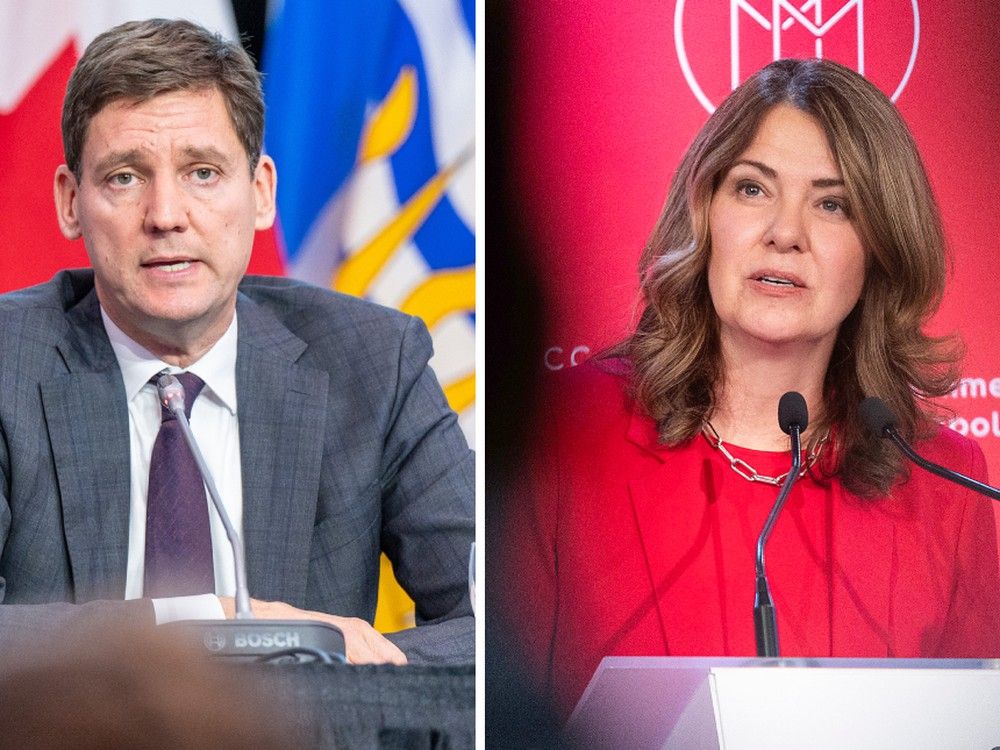
Alberta Premier Danielle Smith’s dream of a pipeline from the oilsands around Fort McMurray to B.C.’s northwest coast faces opposition from both the B.C. NDP and coastal First Nations, but experts say there is little that Premier David Eby can do to stop such a project.
But those experts say the only way such a project would be possible is with billions of dollars of taxpayer dollars from both Alberta and the federal government, which they say is unlikely.
Eby said Tuesday that Canada isn’t the “Danielle Smith show” after his counterpart called B.C.’s rejection of her plan “un-Canadian” and “unconstitutional.”
He added that Alberta’s push for an oil pipeline risks losing First Nations support for B.C. priority projects such as LNG Canada Phase 2, the development of a gas export plant at the Port of Prince Rupert and the Ksi Lisims LNG proposal.
“I didn’t want this fight. I don’t want this fight. We’ve got tons of work to do with Alberta. We can help lower electricity rates for Albertans through interties. We’ve got a hydrogen industry to build together. We’ve got to get federal standards around how to get that hydrogen out to the coast. These are real projects that people actually want to do.” he said.
“But then the premier of Alberta struck a Crown corporation, began calling coastal First Nations, whose support we rely on for billions of dollars of projects, saying this is coming. And then they’re calling me and saying, ‘Is this coming? What’s happening? If you do this, all your other projects we’re going to have to review because of the impacts on the coast.’ And I have to say, ‘Enough.’ ”
In a social media post Tuesday morning, Smith said that “there is no universe where Alberta will tolerate being landlocked in our own country by our neighbouring province,” and that “the economic and job impact of a new Alberta-B.C. oil pipeline, along with the new production needed to fill it, dwarfs any of Premier Eby’s nation-building projects which Alberta has been entirely supportive of.”
The Alberta premier also said Prime Minister Mark Carney had agreed with her on the need for a new pipeline and the efforts to decarbonize the oilsands through carbon capture. She said that she wants an agreement with Ottawa on this by the time the CFL’s Grey Cup rolls around in November.
B.C. Energy Minister Adrian Dix said Smith is bringing forward a purely “political proposal.”
B.C. Conservative Leader John Rustad sided with the Alberta premier, saying that Eby’s opposition is “morally bankrupt.”
Richard Masson, an executive fellow of University of Calgary’s school of public policy and former CEO of the Alberta Petroleum Marketing Commission, said that the $14 million that Smith has committed so far to her new Crown corporation is only enough for the initial scoping work.
While crude pipeline operators Enbridge, Trans Mountain and South Bow Corp have agreed to be on an advisory board for the Alberta government, none has actually proposed building the pipeline.
“The challenge is, we haven’t had as much growth in oilsands production for the last few years for a number of reasons, including a lack of pipeline capacity,” said Masson.
“If there was a new pipeline, then producers might be willing to grow a bit more and sign up for the capacity. They’re not there, and the pipeline companies are just not keen on taking risk.”
Terry Teegee, regional chief of the B.C. Assembly of First Nations, said the bar will be even higher to get approval for a project from First Nations given recent cases involving land rights and the fact First Nations are finally starting to assert those rights.
He also said that Smith is facing enough problems in her own province with a teachers’ strike and is using a pipeline as “political fodder.”
“They’ve been down this road before, and it would be very difficult, especially with the United Nations Declaration on the Rights of Indigenous Peoples being recognized as provincial and federal law,” said Teegee.
UBC economist Werner Antweiler questioned the feasibility of what Smith wants accomplished, noting that tolls to transport bitumen using the existing Trans Mountain pipeline comes out to $13.83 a barrel , eliminating much of the economic benefit of shipping raw bitumen for processing.
He said there is a reason no oil and gas company has jumped forward with a project proposal.
As for whether B.C. could stop a pipeline being built from Alberta to B.C. if a company does actually come forward with a proposal, Antweiler said the NDP have few tools at their disposal.
“In 2019, British Columbia tried to amend the Environmental Management Act to regulate bitumen. This was ruled unconstitutional by the Supreme Court of Canada in 2020,” he said in an email.
“In my assessment of the legal landscape — and I’m an economist, not a lawyer — the province has few if any tools at its disposal to obstruct a proposed oil pipeline.”
The legal decision mentioned by Antweiler was part of B.C.’s efforts under the late John Horgan to use “every tool in the tool box” to stop the twinning of the Trans Mountain Pipeline. Those efforts were ultimately unsuccessful in the Supreme Court of Canada.
Then Green leader Andrew Weaver, who was an intervener in the case and opposed the project alongside the NDP, said that the high court didn’t care about some of the evidence they brought forward and set a dangerous precedent with their decision to block the changes to the Environmental Management Act.
Regardless, he says it leaves the province with little ability to block any project if one is proposed.
“What really I find most frustrating, is that there is no economic case for a heavy oil pipeline to the coast unless taxpayers subsidize it,” said Weaver.
“And that’s what Danielle Smith wants, because that’s what the federal government did with Trans Mountain.”